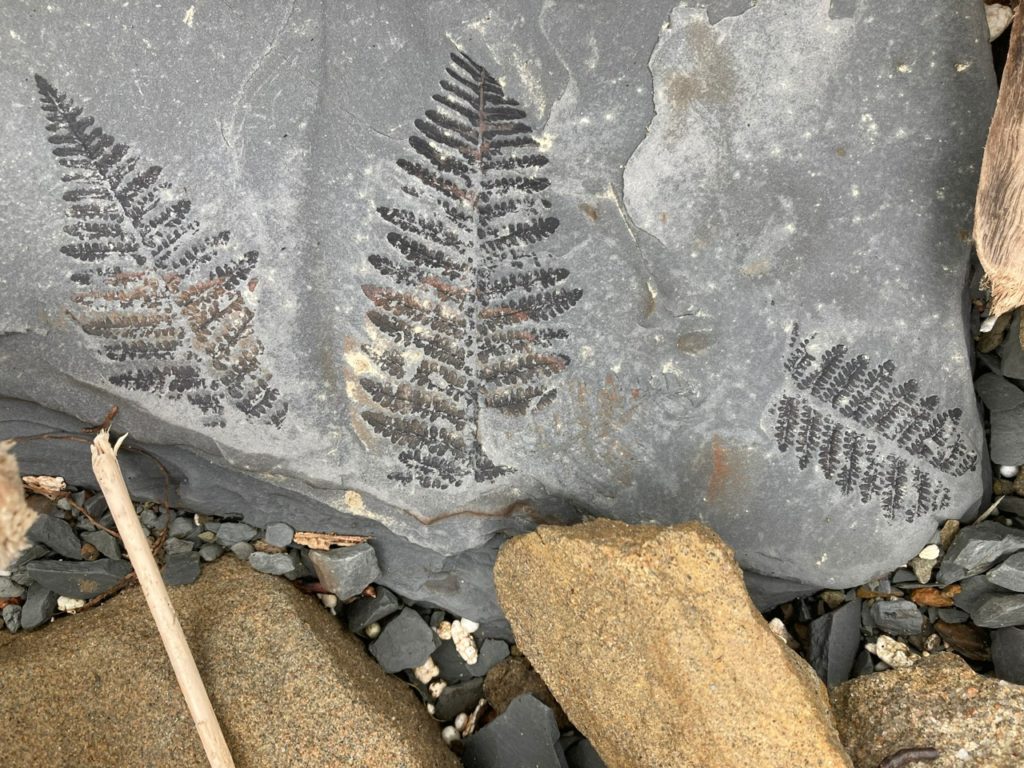Photo Of The Week: Fossil Ferns By Jim Turner

Fossil Ferns. Photo: Jim Turner
I was very fortunate to spend many childhood summers where the land meets the sea on the west coast of beautiful Cape Breton Island, Nova Scotia. I have retuned to my summer home throughout my life and still try to make an annual pilgrimage in October when the weather is large, the leaves are turning colors, and (Canadian) Thanksgiving brings out the best in food, friends and family.
Last year’s sojourn followed right behind hurricane Fiona. She didn’t get much press coverage here in the states, but Fiona was the most destructive natural disaster in Canada for 2022. The track of the storm’s eye passed right over my home stretch of coast, so I was apprehensive about what I would find. Turned out that the storm had broken up, when it first landed, into multiple trails of destruction to the east and west of the eye, leaving a relative calm in my area.
Nevertheless, the massive tides and waves wreaked havoc along the entire shore. The beaches where swept clear to bed rock in some areas and piles of sands, stones, trees, seaweeds, flotsam and jetsam deposited in others. The cliffs behind the the beaches had receded over a meter, changing the coast line while revealing fresh clean views of various geological strata.
While combing through a huge tangle of freshly minted driftwood I spotted a stunning botanical print of three little delicate fossilized fern fronds. I’ve found other fossils over the years but nothing as beautiful and instantly recognizable. This section of coast features deposits laid down during the Carboniferous time period from 300- 360 million years ago. All the fossil fuels that power our modern industrial civilization were sequestered and entombed during this time period. Sixty million years of organic life were folded into the earth’s mantle to be pressure baked over time into various forms and energy densities. From energy-rich sweet crude oils, gaseous methane, solid coals to low-energy yield sources like bitumen tar sands and shale rocks, like my lucky beach find.
Why the organic matter from that time didn’t rot on the surface of the earth, like it does today, is a bit of a mystery. Perhaps the necessary bacteria and fungi had yet to evolve. Fortunately for us they didn’t. The resulting low-carbon earth atmosphere allowed us humans, and the life forms we are accustomed to, to evolve on a cooler, more stable planet.
Unfortunately we have extracted and burned through much of this mother lode in the last couple hundred years or so, the majority of it in just the last few decades. In doing so, we have indelibly changed the chemistry of the planet and are starting to see the consequences with increasingly dramatic weather events, like hurricane Fiona.
My takeaway from my fossil find is that fossil fuels are, in essence, ancient biofuels that derived their energy from the sun. It will be near impossible for real time solar panel energy to compete with, let alone, replace 60 million years of concentrated fossil fern energy.
It is also reassuring to see how life on the planet has persisted for hundreds of millions of years.
Our feature, Photo of the Week, presents each week, a new picture by a local photographer. We invite local photographers to share their photographs here. Please include a description/caption and an indication of who is to be credited.

This photo is indeed stunning, Jim, and your accompanying reflection is beautiful and deep, enabling me to see the fossils in a new way. Thank you for sharing it. So sorry about all the damage done by Hurricane Fiona, but at least it revealed this gorgeous time capsule.
Bravo, Jim!